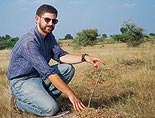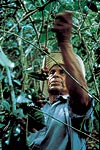 |
Fair
Trade Ensures a Better Cup of Joe
The next time you sip a frothy cappuccino at
Starbucks, know that you have made life more
tolerable for a peasant farmer in Central America.
Starbucks probably charged you anextra dime
for the drink, because the company now pays
its independent coffee suppliers lots more per
pound than they earned before Fair Trade existed.
 |
 |
| Seth
evaluates a reforestation plan in India |
|
This
nonprofit arm of TransFair USA sees to it that
the 550,000-member coffee growers in 21 countries
are paid a minimum of $1.26 per pound. That's
a far cry from the 20 cents
the impoverished farmers earned before Seth
Petchers '95 and his group intervened.
And if the coffee is organically grown, the
farmer can charge 15 cents more. That
why, of the 1.5 million pounds sold annually
in the United States, most of coffee beans are
kept pesticide free and grow under a shaded
forest canopy.
Seth
returned to the States in 1999 after a year
in India and found that TransFair USA "resonated
with the ideals that I was first exposed to
at Oberlin." Like many of his classmates, he
often felt that globalization is a "steamroller
that moves ahead, regardless of the social and
environmental consequences."
At
its core, Fair Trade is a business-based approach
to the alleviation of Third World poverty. By
guaranteeing peasant farmers a fair wage, the
agency helps increase family income, raises
health standards and educational opportunities,
and empowers those who have traditionally been
at the mercy of volatile markets. For the first
time, many farmers can buy mules or donkeys
to help carry their 100-pound packs of coffee
beans down the mountain trails to the harvest
sorting bins--an unimaginable luxury just two
years ago.
 |
| Santiago
Rivera, a Nicaraguan farmer, Picks his
coffee |
 When
Seth became the organization's certification
manager, he designed a monitoring system guaranteeing
that any coffee carrying the Fair Trade Certified
label meets the criteria the group has specified.
TransFair, the parent company, helps the growers
establish large cooperatives to sell beans
directly to huge coffee companiesin hopes
of shutting out the middlemen--known as "coyotes"
in Nicaragua. When
Seth became the organization's certification
manager, he designed a monitoring system guaranteeing
that any coffee carrying the Fair Trade Certified
label meets the criteria the group has specified.
TransFair, the parent company, helps the growers
establish large cooperatives to sell beans
directly to huge coffee companiesin hopes
of shutting out the middlemen--known as "coyotes"
in Nicaragua.
Expanding
its reach, TransFair has initiated certified
tea and soon will arrange for certified chocolate,
honey, and orange juice. Consumers who see
the logo on any of these products can be assured
that they are helping to bring a Third World
farming family into the 21st century.
Seth,
imbued with Oberlin's concept that just one
person can make a difference, headed for San
Francisco after graduation, along with his
band, Package from Sally's, and the classmate
who would become his wife, Joanna Silver.
He served 2,000 meals a day to the homeless
and others at the St. Anthony Foundation in
the Tenderloin neighborhood, then set out
for India. About his current work, Seth says,
"While my contribution is just a small part
of a growing movement, it's certainly exciting
to be part of a new phenomenon of consumer
insistence on products that benefit all parties
involved in their production."
--by Mavis Clark
|
|
|

